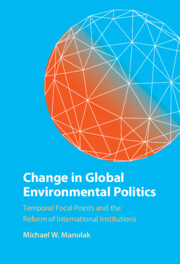 Change in Global Environmental Politics
Change in Global Environmental Politics Book contents
- Change in Global Environmental Politics
- Change in Global Environmental Politics
- Copyright page
- Dedication
- Contents
- Figures and Tables
- Acknowledgments
- Abbreviations
- 1 Introduction
- 2 It’s About Time
- 3 The Stockholm Conference and Institutional Change
- 4 UNEP and the 1982 Nairobi Conference
- 5 The Brundtland Commission and the Seeds of Change
- 6 The Rio Conference and Institutional Change
- 7 Post-UNCED UN Environmental Institutions
- 8 Conclusion
- Bibliography
- Index
1 - Introduction
Institutional Suboptimality in World Politics
Published online by Cambridge University Press: 12 May 2022
- Change in Global Environmental Politics
- Change in Global Environmental Politics
- Copyright page
- Dedication
- Contents
- Figures and Tables
- Acknowledgments
- Abbreviations
- 1 Introduction
- 2 It’s About Time
- 3 The Stockholm Conference and Institutional Change
- 4 UNEP and the 1982 Nairobi Conference
- 5 The Brundtland Commission and the Seeds of Change
- 6 The Rio Conference and Institutional Change
- 7 Post-UNCED UN Environmental Institutions
- 8 Conclusion
- Bibliography
- Index
Summary
This chapter introduces a new framework that analyzes the role of timing and temporality in international institutions and world politics. It describes the temporal coordination dilemmas facing international actors. The chapter details the challenges posed by gradually accumulating incentives to alter international institutions and by the large number of actors that must be brought into the picture if institutional change efforts are to succeed. In realizing major change, a large array of moving pieces must be synchronized at one point in time, entailing considerable complexity and transaction costs. Indeed, the political and analytical investments – both international and domestic in nature – involved in recasting institutions are very substantial. Actors’ willingness to incur a sharp increase in transaction costs depends on their expectations that others will engage in a parallel effort. Thus, even as incentives to alter institutions mount, the inertial drift of institutional life persists until actors are able to reach a temporal convergence of expectations. At that time, actors make substantial investments in change processes and alter fundamentally their bargaining behavior.
Keywords
- Type
- Chapter
- Information
- Change in Global Environmental PoliticsTemporal Focal Points and the Reform of International Institutions, pp. 1 - 33Publisher: Cambridge University PressPrint publication year: 2022
